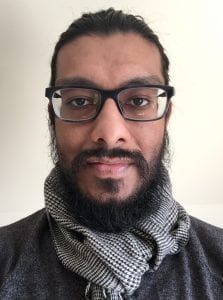 Tanvir Akhtar Ahmed is a graduate student at Brown University’s Department of Religious Studies. He holds a B.A. in International Affairs from the George Washington University, with a specialization in Middle Eastern Studies. His dissertation, “Radical Shadows of God: Islam and Sociopolitical Dissent, 1240–1600,” explores the conceptualization of rebellious behaviors among nonelite persons—artisans, preachers, rural school teachers, soldiers, dervishes, and others—who resisted governmental authority in historical Central Asia and Iran. In it, he aims to recover the sociopolitical imaginaries of these persons, attending in particular to the significance of religious materials such as miracle narratives, cosmology, and Islamic law. His research interests include the critical historiography of Muslim societies, the intersection of religious and radical/leftist politics, and contemporary speculative fiction. In the coming weeks, he plans to take up a postdoctoral fellowship at the Austrian Academy of Sciences’ Institute of Iranian Studies, where he will be working on the Nomads’ Manuscripts Landscape project.
Tanvir Akhtar Ahmed is a graduate student at Brown University’s Department of Religious Studies. He holds a B.A. in International Affairs from the George Washington University, with a specialization in Middle Eastern Studies. His dissertation, “Radical Shadows of God: Islam and Sociopolitical Dissent, 1240–1600,” explores the conceptualization of rebellious behaviors among nonelite persons—artisans, preachers, rural school teachers, soldiers, dervishes, and others—who resisted governmental authority in historical Central Asia and Iran. In it, he aims to recover the sociopolitical imaginaries of these persons, attending in particular to the significance of religious materials such as miracle narratives, cosmology, and Islamic law. His research interests include the critical historiography of Muslim societies, the intersection of religious and radical/leftist politics, and contemporary speculative fiction. In the coming weeks, he plans to take up a postdoctoral fellowship at the Austrian Academy of Sciences’ Institute of Iranian Studies, where he will be working on the Nomads’ Manuscripts Landscape project.
Concept: Salah
The concept I aim to explore for this conference is salah. In Islamic discursive traditions, the term has had a diverse semantic range: alternately expressing moral rectitude, the social weal, and eschatological salvation. My purpose here is to consider the entanglement of these three meanings of salah in the context of radical politics.
To do so, I begin by sketching the use of salah by Muslim rebels in 14th-century Central Asia and Iran as a means of legitimating sociopolitical dissent. Such persons argued that salah “takes priority over revealed law and rational knowledge,” agitating against despotism in both theory and reality. The argument was a contentious one: various proponents of royal power refused such propositions, themselves invoking salah in their condemnations of ‘rebellious’ behaviors.
I do not intend to settle this debate, nor is it my goal to graft 14th-century political theory onto contemporary epistemological frames. The authoritative potential in salah is rooted not in sovereign bodies nor the people, but in the communications of Allah; to merely resurrect an historical notion of salah would limit its use to only those who consider such communiques authoritative. Rather, I mean to consider the possible interplay between radical (republican) politics and the notion of salah. This interplay invites a redefining of salah as ‘social salvation:’ one in which the anarchic possibilities hinted at in its historical deployments are openly stated.
At the same time, I want to ask what sort of pressures—if any—historical notions of resistance place upon contemporary radical political language. Can such conceptual tensions displace the hegemonic dominance of a main tradition of radicalism? How might cognitive and imaginal justice be attained with respect to the past? My hope is that asking these questions will help us push toward radical futures which do not submit to colonial, neoliberal, Orientalist erasures.